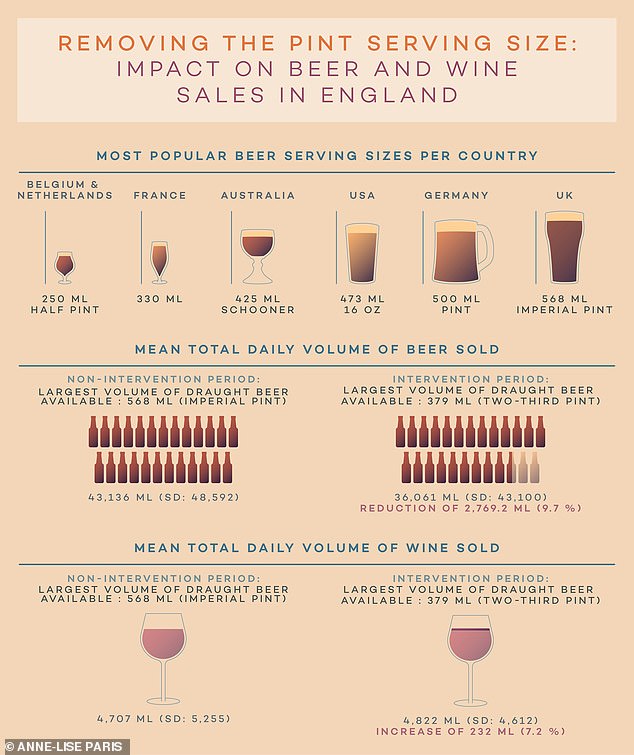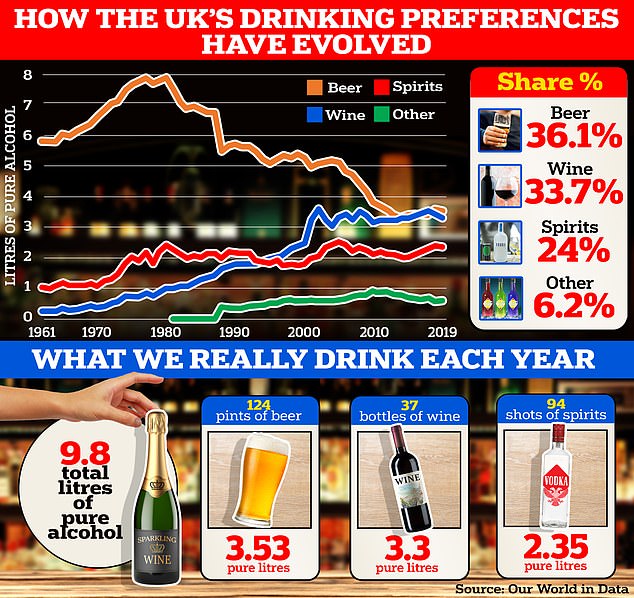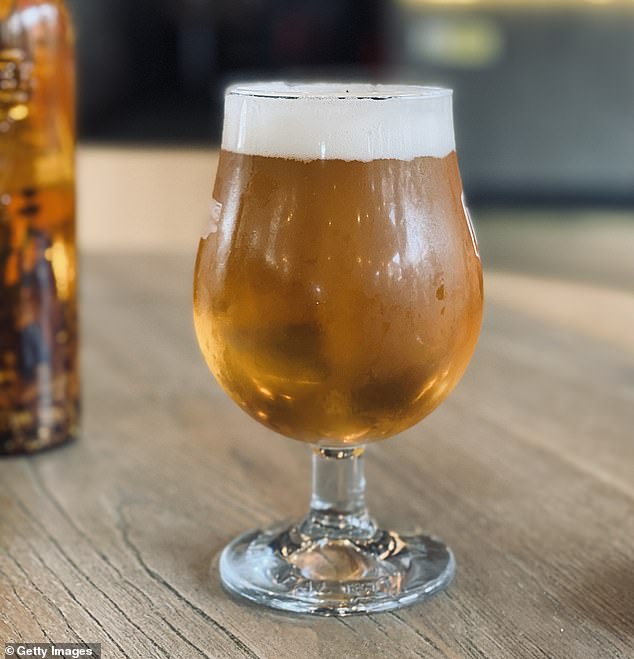Now woke scientists want to shrink your PINT, claiming smaller pints could reduce alcohol consumption in the UK
As long as pubs have been serving beer, the pint has been the generally accepted size for a beer.
But now scientists from the University of Cambridge want to abolish the humble beer in a bid to curb the country’s drinking habit.
In the first study of its kind, researchers convinced 12 pubs to swap their pint glasses for two-thirds servings for four weeks.
Now that the largest portion of beer is a third smaller, pub goers are drinking almost 10 percent less beer and cider compared to when pints were still on the menu.
However, if this recommendation becomes policy, bars could face a 9.6 percent drop in turnover, according to the study.
Scientists want to reduce the size of your pint to help curb drinking habits in Britain after a study found smaller portions reduce alcohol consumption
Although beer consumption in Britain has declined in recent years, health experts still worry that British drinking habits could be damaging to health.
As the researchers point out in their paper, published in PLOS Medicine, reducing alcohol consumption reduces the risk of seven common cancers and diseases.
Lead researcher Professor Theresa Marteau, director of the Behaviour and Health Research Unit, told MailOnline: ‘Alcohol harms health and increases the risk of more than 200 different diseases and injuries, including bowel, breast and liver cancer.
‘In England it is the fifth biggest cause of premature death, illness and disability, and the biggest risk factor for people aged 15 to 49.’
Because raising drink prices or imposing restrictions on beer sales would prove highly unpopular, concerned scientists are keen to find other ways to reduce the number of drinkers.
In this study, researchers asked pubs to scrap the pint service for beer and cider and replace it with a two-thirds glass.
The idea is that people are more likely to drink a set number of drinks than a specific amount of beer, so by making these drinks smaller, they should drink less.

Researchers found that by replacing the 568ml imperial pint with a smaller 379ml two-thirds pint, pub goers drank 10 per cent less beer than they otherwise would have. Although slightly more wine was sold than before
The study took place over three four-week periods, starting with pints being sold as usual, then switching to smaller portions, and finally returning to business as usual.
And as the researchers predicted, the average volume of beer sold dropped significantly during the four weeks when pints were not available.
On average, the twelve locations surveyed sold just under five pints (2.77 litres) less beer and cider per day when the pint glasses were omitted.
Although the researchers expected customers to react very negatively to the change, the catering establishments involved reported only a few complaints.
The volume of wine sold increased slightly during the trial period, by an average of 7.2 percent. However, almost half of this increase came from one location that also functioned as a restaurant.
Professor Marteau and her co-authors write: ‘Because 13 catering establishments no longer offered pints for 4 weeks, the amount of beer sold decreased.
‘This is consistent with emerging literature showing that smaller portions help us drink less and is a novel way to reduce alcohol consumption and improve public health.’
While the researchers argue that this could be an effective way to reduce the health effects of alcohol consumption, they acknowledge that pubs are unlikely to be enthusiastic about the idea.
Despite being offered £3,000 to cover losses and the need for smaller glasses, less than one per cent of venues approached about the trial agreed to take part.
During the trial period, the location’s average daily revenue decreased by five percent due to the decline in beer sales
The total drop in weekly earnings ranged from just £3.70 to £146.60, depending on location.
And when the study was completed, not a single participating bar was able to maintain the maximum two-thirds serving size.
Because it is unlikely that pubs will voluntarily implement this measure, the researchers argue that the regulations are necessary to ban the beer.

Data collected by the World Health Organization and compiled by the Oxford University-backed platform Our World in Data showed that beer consumption in the UK has been falling steadily since the 1980s. Researchers believe further reductions could help alleviate the health effects of alcohol consumption
Professor Marteau said: ‘Abolishing the one-pint serving size would need to be enforced through changes to alcohol licensing regulations, which would set out the sizes in which alcohol is served.’
But with many pubs struggling to stay open, many are concerned about legislation that could hit sales.
A spokesperson for the British Beer and Pub Association told MailOnline: ‘Measures to reduce alcohol consumption should be carefully considered as this research showed that a reduction in beer volumes was associated with a small increase in the purchase of higher strength alcoholic drinks.’
Ash Corbett Collines, vice-chair of the Campaign for Real Ale (CAMRA), told MailOnline: ‘Less than 1% of the hospitality venues approached for the survey agreed to the smaller measure and none of the 12 pubs that did take part opted for the change. So the verdict from the hospitality industry is clear.

Because people tend to order a set number of drinks rather than a specific amount, swapping a pint for a two-thirds glass (pictured) means drinkers consume less alcohol (stock image)
‘Removing the British Pint from pubs would not encourage drinkers to embrace the social and controlled environment of the pub, which encourages moderate drinking. Instead, it would encourage people to drink at home.’
Andy Slee, chief executive of the Society of Independent Brewers, told MailOnline: ‘It should be up to pub owners, brewers and beer drinkers to decide how best to enjoy a local beer.’
Despite the apparent resistance to the policy’s implementation, the researchers believe their findings should be taken into account when considering new regulations.
Professor Marteau says: ‘There is a trade-off between improving public health by reducing alcohol consumption through effective alcohol policies and the health of the alcohol industry.’
